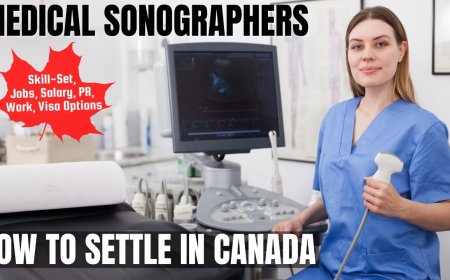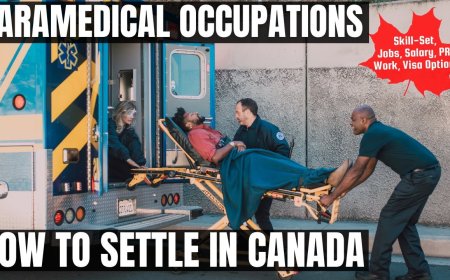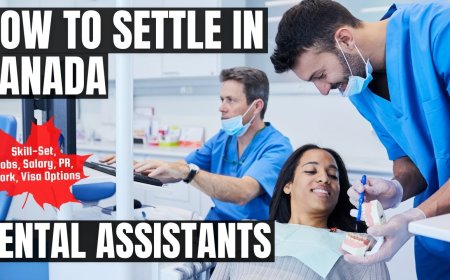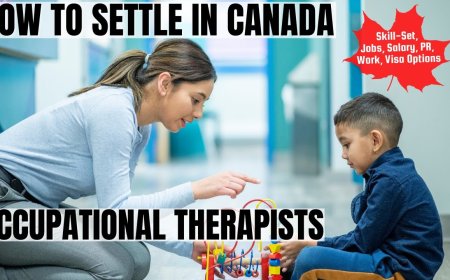Other technical occupations in therapy and assessment Canada Immigration Overview: Key Insights on Salaries, Employment, and Regional Advantages
Welcome to the pathway to Canada immigration for skilled professionals and trade workers. This guide is specifically tailored for Other technical occupations in therapy and assessment looking to work and settle in Canada, offering a deep dive into the essential aspects of immigration and employment in this field.
Introduction
Canada is known for its welcoming attitude towards immigrants, making it a popular destination for those seeking to build a successful career in a new country. In this article, we will explore the career and immigration prospects for Other technical occupations in therapy and assessment in Canada, classified under the National Occupation Classification code NOC 3237. We will cover the profile description, main job duties, education and license requirements, skills needed, salary details, possible visa options, and more. If you are considering a career in therapy and assessment in Canada, this article will provide you with valuable information to help guide your decision-making process.
What is the Profile Description of a Other technical occupations in therapy and assessment as per the Canadian National Occupation Classification (NOC) Standards?
Other technical occupations in therapy and assessment encompass individuals who provide support in various therapeutic and assessment activities. These workers may assist professionals such as audiologists, speech-language pathologists, ophthalmologists, physiotherapists, and occupational therapists in a variety of settings including hospitals, clinics, rehabilitation centers, educational institutions, and private practices. Their roles involve aiding in the delivery of therapy services and conducting assessments under the guidance of licensed professionals.
What are the Main Job Duties of a Other technical occupations in therapy and assessment in Canada?
- Perform diagnostic evaluations and electro acoustic testing to assess hearing loss in adult clients
- Recommend, dispense, fit, and adjust appropriate hearing instruments for clients
- Take earmold impressions and make minor modifications to hearing devices as needed
- Administer tests such as pure tone hearing screening and impedance tests to determine hearing thresholds
- Assist speech-language pathologists and audiologists in assessing patients and carrying out treatment programs
What are the Education, Certifications, and Licensing Requirements to Work as Other technical occupations in therapy and assessment in Canada?
Education and certification requirements vary for different technical occupations in therapy and assessment. For example, hearing instrument practitioners need to complete a three-year college diploma program and undergo supervised training. Licensing is mandatory in most provinces, with membership in the Association of Hearing Instrument Practitioners required in Ontario. Communicative disorders and speech-language pathology assistants typically need to finish a three- to four-year college program. Audiometric technicians must have a specialization in industrial audiometry testing. Ophthalmic medical assistants can complete a one- to two-year college program or a hospital-based training program, in addition to supervised practical training and completion of an approved home study program. Physiotherapy assistants are required to complete a two- to three-year college program or a two-year PTA program with practical training. Occupational therapy assistants must finish a two-year OTA college program. Each occupation has its own specific education and certification requirements to ensure competency in the field.
What Essential Skills are Required for Other technical occupations in therapy and assessment to succeed in Canada?
To be successful in the profession of Other technical occupations in therapy and assessment, individuals must possess a range of essential skills. These include the ability to carry out treatment programs to rehabilitate patients with various injuries or disabilities under the direction of physiotherapists and/or occupational therapists. Additionally, a strong understanding of assessing hearing loss, recommending appropriate hearing instruments, and performing follow-up examinations and adjustments is necessary. Skills in administering tests using specialized equipment, instructing patients on procedures, and accurately recording results, as well as monitoring and calibrating auditory equipment, are crucial. Furthermore, the ability to assist in patient assessments, develop treatment programs, and create materials for patient use is essential. Proficiency in operating ophthalmic testing instruments, recording test results, and administering eye drops, ointments, and medications as directed by ophthalmologists is also required. Overall, a combination of technical expertise, communication skills, compassion for patients, and attention to detail are essential for success in this profession.
What is the Median Age and Retirement Age for Other technical occupations in therapy and assessment in Canada?
It appears that there is missing data for the median age and average retirement age of skilled professionals working in other technical occupations in therapy and assessment. Without this information, it is difficult to make any specific conclusions about the demographics and career trajectory of individuals in this field. It may be important for organizations and researchers to gather this data in order to better understand the trends and characteristics of this particular group of professionals.
How many job openings exist for Other Other technical occupations in therapy and assessment in Canada, and what's their provincial distribution?
There are a total of 63 job openings in Canada for the profile of Other technical occupations in therapy and assessment. The province with the highest number of job openings is Québec with 21 positions available, followed by Ontario with 15 openings. Saskatchewan has 9 job opportunities, while British Columbia and Alberta have 8 and 7 job openings, respectively. New Brunswick has the lowest number of job openings with only 2 positions available. Overall, Québec has the maximum job openings for this profile, while New Brunswick has the minimum. These job openings present a range of opportunities for individuals looking to work in therapy and assessment in various provinces across Canada.
What is the hourly wage or salary of Other technical occupations in therapy and assessment in different Provinces of Canada?
According to the wage data for Other technical occupations in therapy and assessment in Canada, there is variation in wages across different provinces. In British Columbia, the wages range from $15.20 (low) to $26.00 (high) with a median wage of $24.55. Alberta follows with wages ranging from $16.00 (low) to $29.23 (high) and a median wage of $23.00. Saskatchewan offers higher wages with a range from $18.00 (low) to $30.00 (high) and a median wage of $25.00. Ontario has a lower median wage of $18.00, with wages ranging from $14.35 (low) to $28.85 (high). Quebec offers higher wages with a range from $16.00 (low) to $32.69 (high) and a median wage of $24.88. Nova Scotia has wages ranging from $12.95 (low) to $25.00 (high) with a median wage of $22.50. Newfoundland and Labrador offers the highest wages with a range from $12.50 (low) to $35.90 (high) and a median wage of $27.00. Overall, it is clear that there is significant variation in wages for Other technical occupations in therapy and assessment across different provinces in Canada.
What are the various visa options available for Other technical occupations in therapy and assessment migrating to Canada?
Visa options for Other technical occupations in therapy and assessment are currently in high demand in Canada, with opportunities for Category based Express Entry Invitation draws for Canadian PR under the Healthcare Occupations Category. The Express Entry Visa Category is a popular choice for skilled workers looking to immigrate to Canada, while Provincial Nominee Programs and Employer Sponsored Work Visas also offer pathways for individuals in this field. Other technical occupations in therapy and assessment can directly apply under these programs to potentially secure a visa for Canada. Additionally, there may be other visa options currently available for individuals in this profession. To learn more about the specific requirements and opportunities for migration to Canada as a Other technical occupations in therapy and assessment, consider booking an appointment with our immigration professionals for personalized guidance and assistance.
Have Questions or Need Assistance?
If you have any queries or require assistance with your immigration plans, we're here to help. Our experienced immigration consultants are ready to provide personalized guidance tailored to your specific needs.
Don't hesitate to reach out and schedule an appointment today. Whether you're seeking clarification on immigration processes, exploring visa options, or need support with documentation, we're dedicated to assisting you every step of the way.
Book an appointment with our team to discuss your immigration goals and receive expert guidance for your journey to Canada.
What's Your Reaction?
 Like
0
Like
0
 Dislike
0
Dislike
0
 Love
0
Love
0
 Funny
0
Funny
0
 Angry
0
Angry
0
 Sad
0
Sad
0
 Wow
0
Wow
0






































































